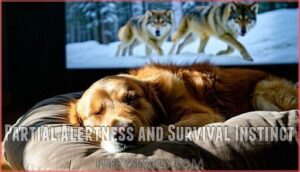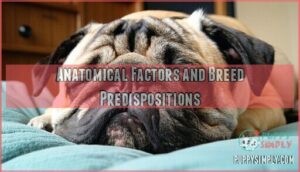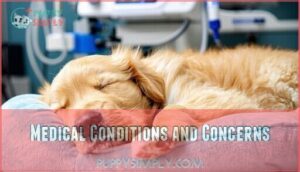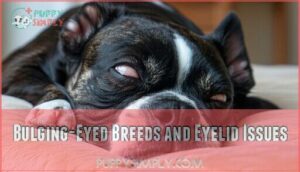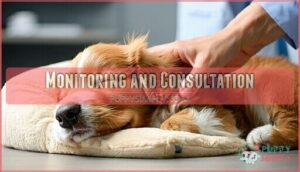This site is supported by our readers. We may earn a commission, at no cost to you, if you purchase through links.
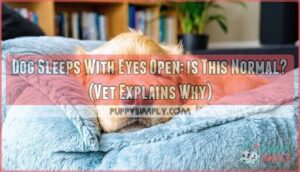
This happens most often in breeds with prominent eyes like pugs and bulldogs, whose facial structure makes complete eye closure difficult. Your pup can still rest properly while maintaining some awareness of their surroundings.
However, watch for signs of discomfort, excessive eye discharge, or changes in sleep patterns. Understanding why this quirky habit occurs can help you determine when it’s harmless versus when professional guidance might be needed.
Table Of Contents
- Key Takeaways
- Dogs Sleep Patterns
- Open Eye Sleeping
- REM Sleep Explained
- Medical Conditions and Concerns
- Senior Dogs and Sleep
- Breeds Prone to Open Eye Sleeping
- Sleep Quality and Disruption
- When to Seek Veterinary Care
- Promoting Healthy Sleep
- Monitoring and Consultation
- Frequently Asked Questions (FAQs)
- Is it normal for a dog to sleep with the eyes open?
- What dog breeds sleep with their eyes open?
- Why is my dog not closing his eyes while sleeping?
- Do dogs sleep with their favorite person?
- Are Certain Breeds More Likely to Sleep With Their Eyes Open?
- Are There Long-Term Effects of Open-Eyed Sleep?
- Could Open-Eyed Sleep Be a Sign of Stress?
- Is Open-Eyed Sleep Normal for Puppies?
- Can dogs dream while sleeping with eyes open?
- Is open-eye sleeping painful for my dog?
- Conclusion
Key Takeaways
- It’s normal behavior – Your dog’s open-eyed sleeping stems from evolutionary survival instincts that helped wild ancestors stay alert for danger, so don’t worry if you notice this quirky habit.
- Certain breeds are more prone – If you own flat-faced breeds like Bulldogs, Pugs, or French Bulldogs, they’re more likely to sleep with eyes open due to their facial structure making complete eyelid closure difficult.
- Watch for warning signs – You should monitor for eye discharge, irritation, disorientation after waking, or sudden changes in sleep patterns that might indicate medical issues requiring veterinary attention.
- Create better sleep conditions – You can improve your dog’s sleep quality by establishing consistent bedtime routines, maintaining a calm environment, and ensuring proper grooming to reduce irritants that disrupt rest.
Dogs Sleep Patterns
You’ve probably noticed your dog sleeping with their eyes partially open and wondered if this behavior is normal.
Dogs have unique sleep patterns that differ from humans, and understanding these patterns helps explain why your pet might rest with their eyes open, which can be attributed to their unique sleep characteristics.
Natural Behavior and Evolution
Your dog’s wild ancestry explains why they sleep with eyes open.
Your pup’s ancient wolf DNA still whispers "stay alert" even during peaceful slumber.
This evolutionary instinct helped their wolf predecessors survive by maintaining sensory awareness during rest.
The behavior tricks predators through deception, making sleeping dogs appear alert and ready to respond.
Their survival instincts enable rapid detection of threats, keeping protective instincts active even while resting peacefully.
Breed Tendencies and Anatomical Factors
Your pup’s facial structure plays a major role in whether they’ll sleep with eyes open.
Brachycephalic breeds like Pugs and Bulldogs face unique challenges due to their shortened snouts and flatter faces.
These genetic predispositions create brachycephalic issues where bulging eyes can’t fully close during rest.
Their breed neurology and anatomical design make complete eye closure difficult, especially in dogs with prominent eye conditions.
Some breeds, like Siberian Huskies, are also known to sleep with their eyes open, which can be related to their breed characteristics.
Sleep Stages and Physiological Aspects
Understanding your dog’s sleep architecture reveals fascinating insights into their nocturnal behavior.
Dogs experience complex sleep cycles similar to humans, shifting between light and deep phases throughout the night.
Here’s what happens during your dog’s sleep stages:
- Light Sleep – Your pup remains partially alert, with brain activity monitoring surroundings
- Deep Sleep – Heart rate slows, muscles relax completely, third eyelid may become visible
- REM Sleep – Intense dog dreaming occurs with rapid eye movements and twitching
- Nocturnal Lagophthalmos – Eyes naturally remain partially open during REM sleep dogs experience
These dog sleep stages create the perfect storm for open-eyed sleeping, making it completely normal behavior.
Open Eye Sleeping
You’ve likely noticed your dog resting with their eyes partially or fully open, and this behavior stems from their wild ancestors’ need to stay alert for danger.
This sleeping pattern allows dogs to maintain some awareness of their surroundings while still getting rest, though certain breeds with specific facial structures are more prone to this behavior.
Partial Alertness and Survival Instinct
Your dog’s open-eye sleeping stems from powerful evolutionary instincts inherited from wild ancestors.
This instinctual vigilance helped pack animals survive by maintaining threat detection capabilities during rest.
Modern dogs retain these ancestral traits, allowing partial sensory awareness even while sleeping.
Their pack mentality drives this behavior, keeping one metaphorical eye open for danger.
Training can help manage a dog’s alertness and behavior, and basic command training is a great place to start.
| Sleep State | Alertness Level | Response Time |
|---|---|---|
| Light Sleep | High sensory awareness | Immediate reaction |
| Deep Sleep | Moderate alertness | Quick awakening |
| REM Sleep | Limited vigilance | Delayed response |
| Drowsy State | Maximum situational awareness | Instant alertness |
| Recovery Sleep | Minimal threat detection | Slow reaction |
This evolutionary blueprint explains your dog’s sleeping habits and natural sleep behavior patterns.
Anatomical Factors and Breed Predispositions
Beyond survival instincts, your dog’s facial structure plays a major role in open-eye sleeping.
Brachycephalic breeds like Bulldogs and Pugs can’t fully close their eyelids due to their shortened snouts and flattened faces.
Dogs with bulging eyes often have eyelids that are simply too small to cover their entire eye surface.
These genetic traits and breed tendencies mean that for some dogs, sleeping with partially open eyes is just part of their normal facial anatomy and dog sleeping habits.
This can also occur during REM sleep stages, when twitching and other movements are common.
REM Sleep Explained
You’ve probably noticed your dog’s eyes moving rapidly under their lids during deep sleep, which signals they’re in REM (Rapid Eye Movement) stage.
This is when your dog experiences vivid dreams and may sleep with eyes partially open while their body twitches and they make soft barking sounds.
Rapid Eye Movement and Dreaming
When your dog’s eyes move rapidly beneath closed or partially open lids, they’re experiencing REM sleep—the dream stage of their sleep cycle.
Those twitching paws and soft whimpers? Your pup is chasing dream squirrels through their sleep adventures.
This fascinating phase reveals active brain function as your pup processes daily experiences.
Here’s what happens during canine REM behavior:
- Eye movements dart back and forth beneath eyelids
- Dream content likely mirrors daily activities like chasing or playing
- Sleep paralysis prevents dogs from acting out their dreams physically
This natural dog sleep cycle indicates healthy brain function.
Twitching and Vocalization During Sleep
Along with eye movements during the dream stage, you’ll notice your dog’s body tells its own story.
Twitching legs suggest they’re chasing something in their sleep world.
Dream Content influences REM Intensity, causing varied physical responses.
Soft barking or whimpers reveal Vocalization Meaning – they’re likely "talking" to dream companions.
Twitch Significance shows normal muscle activity during REM sleep.
Sleep Paralysis prevents full movement, so these gentle motions are completely natural and healthy signs of active dreaming.
They are a result of the dog’s brain being in a state of REM sleep, where Dream Content plays a significant role.
Medical Conditions and Concerns
While open-eye sleeping is often normal, you should watch for signs that suggest medical problems.
Conditions like narcolepsy, eye infections, or seizures can cause unusual sleeping patterns that need veterinary attention.
Narcolepsy and Sudden Sleep Episodes
Narcolepsy causes sudden sleep attacks during normal activities like eating or playing.
Your dog might collapse mid-stride, experiencing cataplexy symptoms where muscles go limp.
Certain breeds show higher predisposition to this neurological condition.
Diagnosis challenges arise because episodes resemble seizures initially.
A veterinarian visit becomes essential for proper evaluation.
Treatment options exist, though this dog sleep disorder requires ongoing medical management.
Eye Conditions and Infections
Eye infections can mimic open-eye sleeping when they prevent proper eyelid closure.
Conjunctivitis, corneal ulcers, and glaucoma create inflammation that keeps eyes partially open during rest.
Watch for these warning signs:
- Eye discharge or excessive tearing
- Red, swollen eyelids or eye irritation
- Vision changes or squinting behavior
Dry eye and other dog eye problems need prompt veterinary attention to prevent complications, especially since they can lead to serious issues if not treated, making regular check-ups crucial.
Seizures and Neurological Disorders
Sometimes what looks like abnormal dog sleep might actually be seizures in disguise.
During epileptic episodes, your dog’s eyes stay wide open with a rigid, tense expression that’s different from peaceful rest.
These neurological disorders require immediate veterinary checkup and specialized treatment options.
Seizure recognition helps distinguish between normal sleeping patterns and serious medical conditions needing veterinary neurology expertise for proper disorder diagnosis.
Senior Dogs and Sleep
As your furry friend enters their golden years, you’ll notice their dog sleep patterns shifting like clockwork.
Aging dogs face unique challenges that can lead to sleeping with eyes partially open more frequently than their younger counterparts.
Age-Related Insomnia becomes common in older dogs, causing restless nights and lighter sleep phases.
Your senior pup might struggle with Cognitive Decline, similar to dementia in humans, which disrupts normal canine sleep patterns.
Joint Pain from arthritis makes finding comfortable positions difficult, leading to frequent position changes during rest.
Medication Effects from treatments for various conditions can alter sleep cycles.
Some older dogs develop Sleep Apnea, particularly overweight seniors, causing breathing interruptions that keep them in lighter sleep stages.
These factors combine to make older dogs more prone to partial alertness during rest.
Their bodies can’t achieve the deep, restorative sleep they once enjoyed.
You might notice your senior dog startling more easily or appearing to watch their surroundings even while resting.
Breeds Prone to Open Eye Sleeping
If you own a flat-faced breed like a Bulldog or Pug, you’ll likely notice they sleep with their eyes partially open more often than other dogs.
Their shorter snouts and prominent eyes make it harder for their eyelids to close completely during sleep.
Brachycephalic Breeds and Facial Structure
Flat-faced dogs with smushed-in faces struggle more with eyelid closure during sleep.
Short-faced breeds like Pugs, French Bulldogs, and Boston Terriers have unique facial conformation that makes complete eye closure difficult.
Their shortened snout length and compressed facial structure create anatomical challenges.
These breathing issues often accompany dental problems in brachycephalic breeds.
Their big eyes and altered facial anatomy naturally contribute to partial eye opening during rest periods, which can be a significant issue for dogs with smushed-in faces and shortened snout length.
Bulging-Eyed Breeds and Eyelid Issues
Beyond flat-faced breeds, dogs with bulging eyes face unique challenges when your dog sleeps with eyes open.
These breeds often struggle with eyelid closure problems due to their breed-specific anatomy.
Here’s what creates sleeping difficulties:
- Prominent eyes outgrow eyelid capacity in Boston Terriers and Pekingese
- Inadequate eye lubrication needs increase corneal exposure risks during rest
- Compromised nictitating membrane function affects natural eye protection
- Lagophthalmos may require surgical eye correction in severe cases
Regular veterinary monitoring helps prevent complications.
Sleep Quality and Disruption
When your dog sleeps with eyes open, it can affect their sleep quality and lead to disrupted rest cycles.
Environmental factors like noise, light, and temperature changes can worsen this condition, preventing your pet from getting the deep, restorative sleep they need.
Incomplete Eye Closure and Sleep Fragmentation
When your dog sleeps with eyes open, incomplete eye closure disrupts their natural sleep quality.
This fragmented sleep pattern increases sleep arousal frequency, preventing deep restorative cycles.
Without proper eye lubrication from closed lids, the nictitating membrane works overtime to protect exposed corneas.
Sleep deprivation from constant micro-awakenings can create cognitive impact over time, and your dog’s brain struggles to process memories and emotions effectively, making quality sleep essential for their overall well-being and mental sharpness, which relies on proper rest to function correctly.
Environmental Factors and Sleep Disturbances
Environmental disruptions substantially impact your dog’s sleep quality and can trigger open-eye sleeping episodes.
Light exposure from streetlights or electronics confuses natural sleep cycles, while excessive noise levels keep dogs partially alert.
Temperature control matters – rooms that’re too hot or cold prevent deep rest.
Poor bedding comfort forces awkward sleeping positions, and an unsuitable sleep location increases stress and anxiety.
Consider investing in a dog calming bed to ease anxiety.
Creating a calm, dark, quiet sleep environment with comfortable bedding helps your dog achieve better rest and reduces sleep disturbances.
When to Seek Veterinary Care
You should contact your vet if your dog shows signs of distress after waking, such as disorientation or trouble walking.
It’s also important to seek care if you notice unusual sleep patterns, like falling asleep during play, or if your dog can’t be roused from sleep.
Signs of Distress and Disorientation
After waking, watch for post-wake confusion that leaves your dog stumbling around like they’ve forgotten where they are.
Gait abnormalities, responsiveness issues, or strange behavior signal potential problems.
If your pup shows cognitive decline, behavioral changes, or seems stuck in a fog of disorientation, it’s time for a vet visit.
Stress and anxiety can also trigger unusual dog sleep behavior that warrants professional attention, including issues that may indicate post-wake confusion or lead to a vet visit.
Unusual Sleep Patterns and Seizure Symptoms
Some unusual dog sleep behavior can mask serious neurological issues. Seizure mimicry during sleep appears deceptively normal but requires immediate veterinary consultation.
Watch for these warning signs:
- Fixed, wide-open eyes with complete unresponsiveness
- Excessive twitching lasting more than brief dream episodes
- Post-seizure disorientation or confusion upon waking
- Sleep disruption patterns occurring repeatedly
- Diagnostic videos help veterinarians assess concerning behaviors
Post-seizure care often involves monitoring recovery patterns and documenting sleep abnormalities, which can be crucial for effective treatment and understanding sleep disruption.
Promoting Healthy Sleep
You can help your dog achieve better sleep quality by establishing consistent bedtime routines and creating a calm environment.
Regular grooming, proper nutrition, and maintaining a comfortable sleeping area will support your pet’s natural sleep patterns and overall health.
Regular Schedules and Relaxation Techniques
Creating a Consistent Bedtime routine helps regulate your dog’s natural sleep cycle and reduces anxiety in dogs.
Just like humans, dogs thrive on predictability.
Establish regular exercise sessions before bedtime to tire them out naturally – Exercise Benefits include deeper, more restful sleep.
Consider playing Calming Music or providing gentle Massage Therapy to promote dog relaxation.
A Safe Environment free from loud noises and distractions supports quality dog sleep while minimizing stress in dogs and dog anxiety.
Remember that Aussies need ample sleep to maintain their health.
Grooming and Care for Optimal Sleep
Beyond establishing routines, proper grooming and care substantially impact your dog’s sleep quality.
Regular grooming removes irritants that might disrupt rest, while maintaining clean bedding creates a comfortable sleeping environment.
Your dog’s breed specifics matter too – some need extra eye care or facial cleaning.
Essential grooming practices for better dog sleep include:
- Daily brushing – Removes loose fur and stimulates relaxation through gentle massage
- Weekly baths – Prevents skin conditions that cause nighttime scratching and restlessness
- Eye cleaning – Eliminates discharge buildup that irritates brachycephalic breeds during sleep
- Dental care – Reduces mouth discomfort that disrupts peaceful rest periods
Healthy diet choices support natural sleep cycles, while comfortable bedding accommodates your dog’s preferred sleeping positions.
High-quality dog grooming products are essential for these tasks.
Monitoring and Consultation
You should keep track of your dog’s sleep patterns and watch for any changes in their behavior or health.
If you notice unusual sleep habits or have concerns about your dog’s open-eyed sleeping, it’s best to consult with your veterinarian for proper guidance and peace of mind.
Tracking Sleep Patterns and Health Changes
Keeping a watchful eye on your dog’s rest habits helps catch problems early.
Sleep pattern changes often signal underlying health issues before other symptoms appear.
Create behavior video logs when you notice anything odd – vets love seeing actual footage.
Watch for disorientation after waking or inability to rouse your pup during normal sleep times.
Monitor unusual signs like excessive drooling, rigid posture, or strange eye movements during rest periods.
Consider using a dog sleep tracker to identify subtle changes and catch underlying health issues before they become severe, which can be signaled by sleep pattern changes, and help with early diagnosis of potential problems, making it easier to take corrective action and ensure your dog’s well-being by tracking their rest habits.
Consulting a Veterinarian for Reassurance and Guidance
When tracking reveals concerning patterns, your veterinarian becomes your best ally for peace of mind.
Veterinary reassurance helps distinguish normal quirks from genuine dog health concerns. When to consult depends on documenting sleep changes and unusual symptoms you’ve observed.
Consider scheduling an appointment if you notice:
- Your dog falls asleep mid-play like they’ve hit an invisible snooze button
- Eyes stay wide open with rigid body posture during apparent sleep episodes
- Disorientation or stumbling after waking from open-eyed rest
Veterinary advice provides clarity when dog sleep behaviors seem off. Regular checkups are important for early disease detection.
Frequently Asked Questions (FAQs)
Is it normal for a dog to sleep with the eyes open?
Like a security guard on night duty, your dog’s partially open eyes during sleep show their wild instincts at work.
Yes, it’s completely normal—they’re staying alert for potential threats while catching some Z’s.
What dog breeds sleep with their eyes open?
Brachycephalic breeds like Bulldogs, Pugs, and French Bulldogs commonly sleep with eyes open due to their flat faces and bulging eyes.
Their shortened snouts make complete eyelid closure difficult during rest.
Why is my dog not closing his eyes while sleeping?
Your dog’s likely following ancient survival instincts, staying partially alert while resting.
This behavior’s normal for many breeds, especially those with flat faces or prominent eyes that can’t fully close their eyelids, and is a result of their ancient survival instincts.
Do dogs sleep with their favorite person?
Your furry companion will often choose to snooze right beside their favorite human. Dogs naturally gravitate toward their beloved owner’s scent, warmth, and presence for comfort and security during sleep.
Are Certain Breeds More Likely to Sleep With Their Eyes Open?
Yes, flat-faced breeds like Bulldogs, Pugs, and French Bulldogs are more prone to sleeping with eyes open.
Their shortened snouts and bulging eyes make it harder for their eyelids to close completely during rest.
Are There Long-Term Effects of Open-Eyed Sleep?
Generally, there aren’t significant long-term effects from your dog’s open-eyed sleep.
However, persistent eye dryness or irritation could develop.
Monitor for redness, discharge, or discomfort, and consult your vet if concerns arise about discomfort.
Could Open-Eyed Sleep Be a Sign of Stress?
While stress can affect your dog’s sleep patterns, open-eyed sleeping isn’t typically a stress indicator.
It’s usually normal behavior from evolutionary instincts or breed characteristics.
However, sudden changes in sleep habits might warrant attention.
Is Open-Eyed Sleep Normal for Puppies?
Puppies frequently sleep with their eyes partially open during development.
It’s completely normal as their sleep patterns and neurological systems mature.
You’ll notice this behavior decreases as they grow older and establish regular sleep cycles, which is a normal part of their development.
Can dogs dream while sleeping with eyes open?
Dreams happen lightning-fast during REM sleep, even with your dog’s eyes slightly open.
You’ll notice twitching, soft barks, and running motions as they chase dream squirrels while maintaining that half-alert ancestral survival instinct.
Is open-eye sleeping painful for my dog?
Open-eye sleeping typically isn’t painful for your dog.
It’s usually a natural behavior from their evolutionary past.
However, if you notice eye irritation, discharge, or your dog seems uncomfortable, consult your veterinarian promptly.
Conclusion
Like a faithful guardian watching over their territory, your dog’s open-eyed slumber reflects millions of years of evolutionary wisdom.
When your dog sleeps with eyes open, it’s typically normal behavior rooted in survival instincts and breed characteristics.
Monitor for signs of distress, excessive discharge, or unusual patterns that might indicate underlying issues, and don’t hesitate to consult your veterinarian if you notice concerning changes in your pet’s sleep habits or overall health.
Most dogs rest comfortably this way, but it’s essential to be vigilant for any signs that may require professional attention, ensuring your pet’s well-being and addressing any potential issues promptly, with a focus on their overall health.
- https://pawsafe.com/blogs/dog-behavior/why-does-my-dog-sleep-with-his-eyes-open
- https://www.scenthound.com/dogblog/is-it-weird-that-my-dog-sleeps-with-its-eyes-open
- https://iheartdogs.com/reason-dogs-sometimes-sleep-with-their-eyes-open/
- https://dog-gear.com/why-does-my-dog-sleep-with-its-eyes-open/
- https://vetmed.tamu.edu/news/pet-talk/seeing-the-signs-what-to-know-about-cherry-eye-in-dogs/

